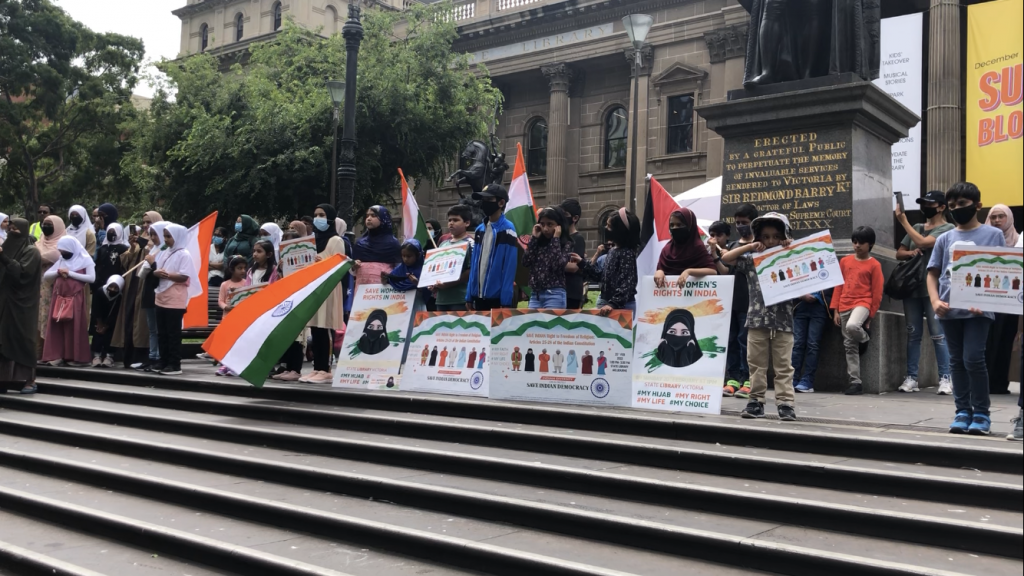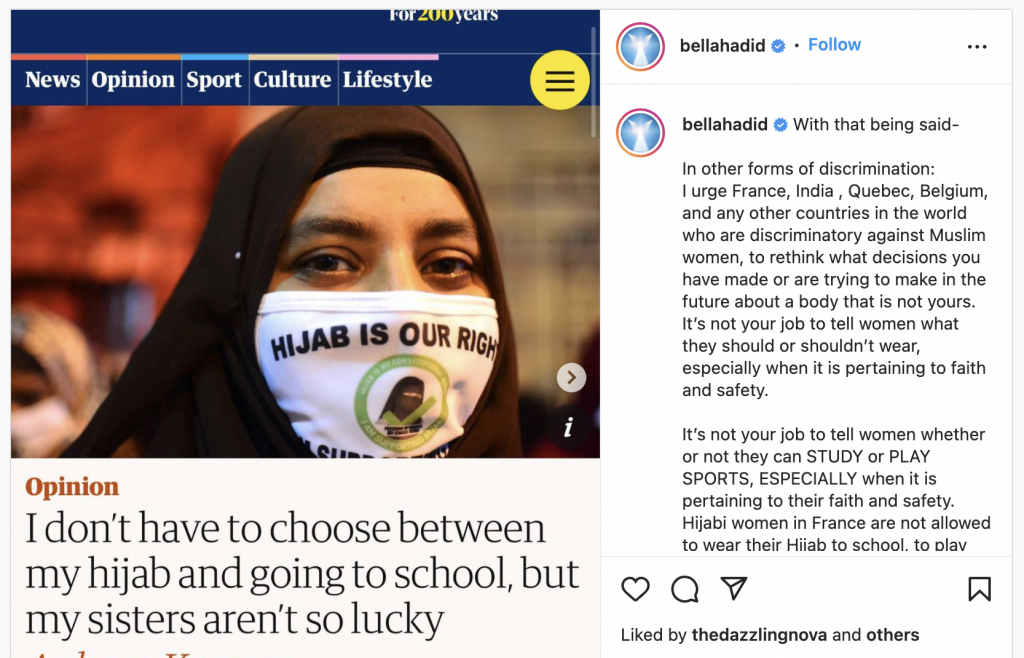Protestors stood in front of State Library of Victoria carrying placards saying ‘Save Women’s Rights in India’ and ‘Hijab – My Right, My Choice’. Several others carried posters with ‘My Life’ and ‘Hijab is my Right’ written on them.
Hundreds of Indian Australians, including many belonging to the Muslim faith, on Sunday held a protest at the State Library of Victoria against what they termed as an unconstitutional ban on the right of Muslim students and teachers to wear a hijab.
This followed protests held in several US cities on Saturday by several overseas organisations including Indian American civil rights groups and activists.
It all began in India’s southern state of Karnataka, where Muslim female students were suddenly barred from entering their classroom wearing a hijab. Undaunted, six students carried on their studies sitting outside their classrooms, which garnered support from several international figures.
Thereafter, a video of a group of Hindu men in Karnataka harassing a Hijab-clad Muslim college student named Muskan, went viral on social media. This triggered protests from people all over the world in support of the defiant young girl who held up her fists and forced her way in to college.
The program in Melbourne started with the Acknowledgement of Country followed by the Indian and Australian national anthems. Several girl students from schools and universities were among those who addressed the gathering.
Sara Fawadi, a university student called the ban “absolutely ridiculous, shameful and hypocritical because schools are meant to be a safe place for learning where generations are brought up and they have been turned into a discriminatory environment where people are being brainwashed to hate each other.”

Gisella Ali, representing The Humanism Project, a secular social justice advocacy group of Indians in Australia, said, “India’s Constitution encourages plurality, protecting Indian citizens from any form of religious discrimination that we’re now seeing in action. Uniforms in schools are meant to minimise differences between students of different and unequal economic classes. They are not intended to impose cultural uniformity on a plural country. This is why Sikhs are allowed to wear turbans not only in the classroom but even in the police and Army. This is why Hindu students wear bindi/tilak/vibhuti with school and college uniforms without comment or controversy. Likewise, Muslim women should be able to wear hijabs with their uniforms.”
“Women should be able to access education, employment and public spaces without being shamed or punished for their clothes. We stand with every woman who is told that she can’t enter her educational institution because she’s wearing a certain form of clothing,”, she added.
Activist Tanvi Mor said although hijab was not part of her culture or her religion, she understood respect, dignity and tolerance; and what it means for a woman to have access to education as a fundamental right. “We have come to a stage where a dress code has turned into a religion issue and being given greater importance that a girl’s right to education without discrimination”, adding that the majority of the population should have no say in the matter of a Muslim woman’s right to wear a hijab.
“We have fought a century long battle to fight for women rights, let’s not push them backwards or become a hurdle in their progression. For any country to progress, women empowerment is critical in every section of the society. It can not be seen in isolation rather a collective effort.”, she said.
More protests are being planned in other Australian and New Zealand cities in the coming days.
Support for these girls have been coming from all corners of the globe.
Nobel Peace Prize winner Malala Yousafzai tweeted, “Refusing to let girls go to school in their hijabs is horrifying. Objectification of women persists — for wearing less or more. Indian leaders must stop the marginalisation of Muslim women.”
The Ambassador at Large for International Religious Freedom (IRF), tweeted on 11 February that “religious freedom includes the ability to choose one’s religious attire.”
“The Indian state of Karnataka should not determine permissibility of religious clothing. Hijab bans in schools violate religious freedom and stigmatise and marginalise women and girls,” Rashad Hussain said in the tweet.
In Europe, Students and scholars of Erasmus University, Rotterdam in The Hague have issued a statement of solidarity too. A statement from them read: “The students have been singled out, brutalised, and victimised under threats from Hindu majoritarian intimidation and state-backed violence.”
“We unconditionally support the Muslim students’ acts of resistance and endorse the demands of these students to be granted their constitutional rights— freedom of expression, practicing their faith and access to education,” said the statement.
Prominent voices in South Africa have spoken up against the harassment of these students in Karnataka.
Ashwin Trikamjee, the head of the South African Hindu Maha Sabha, said: “All cultures, including cultural practices and beliefs, must be respected by all,” she said speaking to South African news website, IOL News.
Arthi Nanackchand Shanand, the President of Arya Samaj in South Africa, told IOL that if the institution in Karnataka specified a particular dress code, then students had to comply. However, she believed that Hindu men had no right to prevent Muslim women from wearing the hijab to class. “It does not concern them. It’s a matter between the school management and the students. As a Hindu priest (of the Vedic Purohit Mandal), I can safely say that our scriptures do not support patriarchy, on the contrary, they support dignity and respect for all women.”
Human Rights Watch, an international non-governmental organisation, headquartered in New York City, posted a Tweet on Twitter saying, wearing a hijab should be a personal choice. The government’s hijab restrictions in schools and colleges violate India’s obligations under international human rights law.
Some well-known figures have also joined in to denounce this policy of barring Muslims girl from attending classes.
American model, Bella Hadid in a few powerful Instagram posts has been calling on people to stop discriminating against Muslim women. She has urged countries to rethink what decisions they have made or are trying to make in the future about a body that is not theirs.

French football star and Manchester United midfielder, Paul Pogba has shared a video clip of protests featuring burqa-clad girls being harassed by saffron-scarved boys. The 28-year-old footballer shared the clip, on his Instagram story with the caption: “Hindutva mobs continue to harass Muslim girls wearing hijab to college in India.”
Sonny Bill Williams, current heavyweight boxer and a former member of New Zealand’s Rugby team that won the world cup twice, tweeted in support. He said: “These thugs may rip your headscarves off your head but they’ll never rip Islam or Allah from your hearts. So, stay strong sisters, send love and duas to you and your families.”
Follow NRI Affairs on Facebook and Twitter for latest updates. Support us on Patreon.











